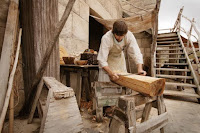Jesus and his Destiny
 |
Jesus consented to be baptized by John, so that everything would be done rightly. Then the Holy Spirit descended upon him and a voice from heaven said, "This is my beloved Son, in whom I am well pleased."
So he is confirmed as God's Son, the Messiah who was predicted! It's time for him now to forsake his career as a carpenter, and take up the role of prophet, for John the Baptist had prepared the way. BUT one more thing must happen, before Jesus begins to preach. What is it?
My thesis is that Jesus, as fully man, learned things the way we learn them: that is, the Holy Spirit reveals them to us. Jesus knew the scriptures, which said that the Messiah was destined to be scorned, beaten, and cruelly murdered by hanging on a cross. But now he had to deal with that fully, accepting those horrid facts into his life as a physical reality. We know that Jesus struggled with this to the very end, praying "Father, if at all possible, take this from me. But not as I want it, but as you want it." This could only be dealt with alone, in the desert, where he was driven by the Spirit.
Driven by the Holy Spirit
As Jesus wandered in the desert, he was led around by the Holy Spirit.
Alone with the Wild Beasts
Only Mark's Gospel mentions Jesus being with the wild beasts. Thus Mark confirms the scripture: "The wild beasts will honor me: The jackals and the ostrich."
Prayer, Fasting, and Hunger
As a middle-class carpenter, it is unlikely that Jesus had dealt with near-starvation before. The number of completion is 40, but before Jesus had completed his 40 days of fasting, he knew what starvation felt like. It even may have affected his mind, so that the very rocks would begin to look like bread. But he is here to resolve what his life holds for him, and what he is called to say to the people of Israel.
Satan Speaks
In the stillness of the desert, Jesus could hear the devil speaking: "You don't have to wait for a time of completion. You can have something to eat right now. You can turn these stones into bread. Go ahead, you can do it! If you are really the Son of God, you have the power."
Tempting, right? But something was wrong. If the Holy Spirit sent him out here, it was for a reason, and the reason was probably not to feast on whatever succulent food he could find--or conjure--out here. Besides, what was really keeping him alive out here? Something to eat? Or his Father in heaven?
Jesus reached deep into scripture and answered Satan, "Man shall not live on bread alone, but on every word that proceeds from the mouth of God."
The Pinnacle of the Temple
But Jesus' mind leapt ahead to his coming ministry. John the Baptist had made his mark, Baptizing by the Jordan. Everyone knew about him. But who ever heard of Jesus? He's just a carpenter, and the son of a carpenter. How will people get to know him? Why would they come out into the desert to hear a carpenter speak, a carpenter who had never done anything amazing? How would they know that Jesus is the Son of God?
Satan had an answer for him. He took Jesus to the pinnacle of the temple in Jerusalem, and said to him, "If you are really the Son of God, then just throw yourself down from here. For in Scripture it is written, 'He will command his angels concerning you that On their hands they will bear you up, so that you will not strike your foot against a stone.'"
So now the devil was throwing the words of Scripture at Jesus, showing him how he could become well known. But Jesus had a few words to throw back: "On the other hand, in Scripture it is written, 'You shall not put the Lord your God to the test.'"
(In Luke's Gospel, he places this incident second, but he connects the three incidents with "and..." ..."and..." Matthew's Gospel is more specific: he introduces this incident with "Then..." and introduces the final incident with "Again, ..." Matthew has specified for us what the correct order was for the three temptations by Satan.)
The Kingdoms of the World
5
But Satan is not done yet. Was Jesus troubled about the prospect of being tortured and nailed to the cross? You bet he was. So the devil threw his best shot, showing Jesus how he could avoid all that pain.
Satan took him to a very high mountain and showed him all the kingdoms of the world and their glory, and he said to Jesus, "All these domains and the glory that you see I will give to you, for it has been handed over to me, and I can give it to whomever I wish. So if you worship before me, it shall all be yours."
Jesus had a ready answer for the devil's wiles: "Leave me, Satan! For it is written, 'You shall worship the Lord your God and him only!" So Satan departed, biding his time for the next opportunity he would have to tempt Jesus.
Angels Came to Minister
Jesus passed the test. In fact, he passed all three tests. Angels came and ministered to him, until it was such time that he would begin to reveal himself to the world.


















































